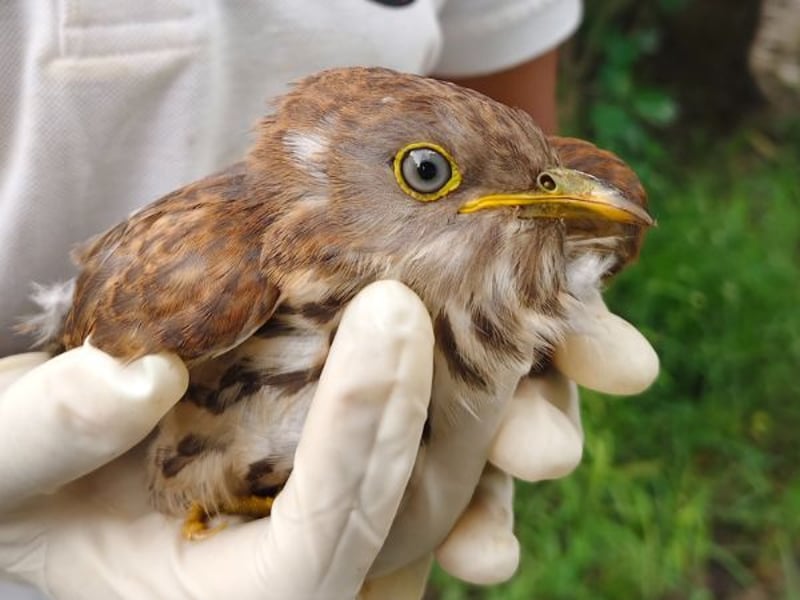
This July, discover how Civets, Spotted Doves, Burmese Pythons, Common Mynas, and a common Hawk-Cuckoo were rescued and returned to their natural habitats.
In July 2025, our Animal Protector Program carried out 56 interventions and rescued and rehabilitated 69 animals across diverse species. From venomous snakes and rare birds to small mammals and even a scorpion, every life was given the care, respect, and chance at freedom it deserves.
What species did we help this month?
This month we helped so many different species including: Banded Krait, Burmese Python, Cantor’s Kukri, Checkered Keelback, Common Hawk-Cuckoo, Common Wolf Snake, Copper-headed Trinket, Indian Palm Squirrel, Indian Rat Snake, Juvenile Common Wolf, Juvenile Spectacled Cobra, Russell's Viper, Spectacled Cobra, Wall's Krait, Spotted Dove, Starling Bird, Asian Palm Civet, and a Scorpion.
Each rescue is a reminder that no matter how big or small, every life matters.
Four Spotted Doves Take Flight Again
On 1st July 2025, local residents in Shimuliapara, Gaighata (North 24 Parganas) spotted a fallen nest with four tiny Spotted Dove fledglings inside. Too young to survive on their own, the chicks were at risk. Thankfully, community members quickly alerted our team, who stepped in to rescue the little birds.
Though unharmed, the doves needed care, warmth, and regular feeding before they could return to the wild. For the first two weeks, they were gently hand-fed with a nutritious formula several times a day and later introduced to fruits like berries to prepare them for natural foraging. To help them grow stronger, they were housed in a safe enclosure with branches to perch on and space to practice short flights.
Over 19 days of care, the fledglings transformed, gradually learning to perch, flap their wings with confidence, and even feed themselves. On 20th July 2025, healthy and active, the four young doves were released back into the wild at their place of rescue.
This story is a beautiful reminder of how community awareness, quick response, and your support can give vulnerable animals a second chance at freedom.
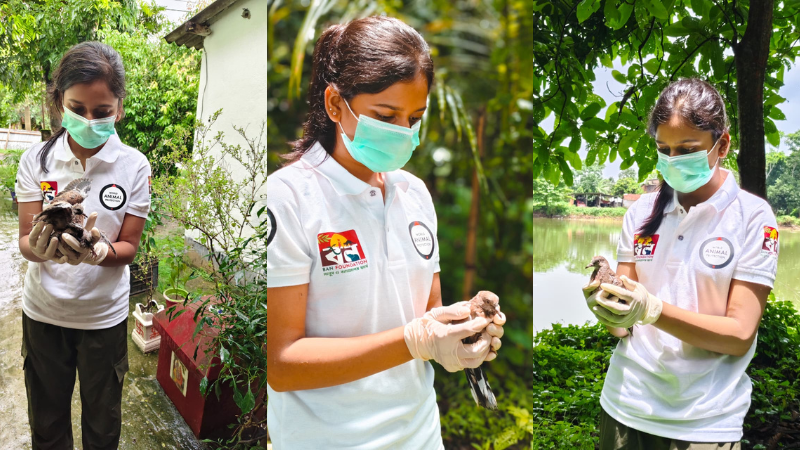
Two Asian Palm Civets return to the wild
On 7th July 2025, two tiny Asian Palm Civet juveniles were found after falling from a coconut tree in Gaighata, North 24 Parganas. A local woman, unaware of wildlife laws, tried to keep them at home. Fortunately, one of her neighbors—who had attended our awareness sessions—stepped in, explained the risks of keeping wild animals, and helped ensure the civets were handed over to our team.
When rescued, the little civets were weak, malnourished, and suffering from heavy parasitic infestations. They received immediate veterinary care, including supplements, deworming, and proper nutrition to regain their health. Slowly, they transitioned from milk to a balanced diet of fruits, chicken, and even natural prey like mealworms and cockroaches, preparing them for survival in the wild.
To encourage natural behaviors, the civets were provided ropes to climb, hidden food to forage, and opportunities to practice their nocturnal skills. Human interaction was kept minimal to ensure they would not grow dependent on people. Over the course of several weeks, they regained strength, honed their instincts, and showed readiness for life back in the forest.
On 8th August 2025, both civets were released in Bangaon, strong, healthy, and prepared for independence. Their story is a powerful example of how awareness, rescue, and rehabilitation come together to restore wild animals to their rightful home.
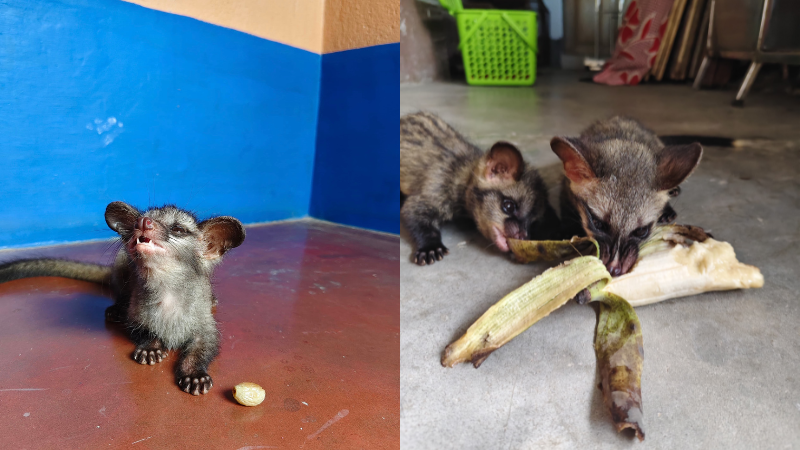
Four Burmese Pythons Safely Returned to the Wild
In July 2025, our rescue teams were called to different parts of Coochbehar and Alipurduar where four Burmese Pythons had wandered into human settlements. One of them had become dangerously entangled in a garden net, while the others had taken refuge in homes and backyards during the monsoon rains.
Despite their enormous size, which often triggers fear, the local communities showed remarkable restraint. Thanks to years of awareness programs by our volunteers, people recognized that these snakes are ecologically vital and legally protected. Instead of harming them, they contacted us for help.
Our team responded quickly, carefully freeing the python from the net and checking all four individuals for injuries. Thankfully, each snake was unharmed and healthy. After ensuring their safety, the pythons were released into suitable natural habitats on the same day, where they could thrive without posing risks to people.
This successful rescue is not just about saving four snakes, it reflects a growing shift in local attitudes. When communities choose coexistence over fear, wildlife gets a second chance to live freely in the wild where they belong
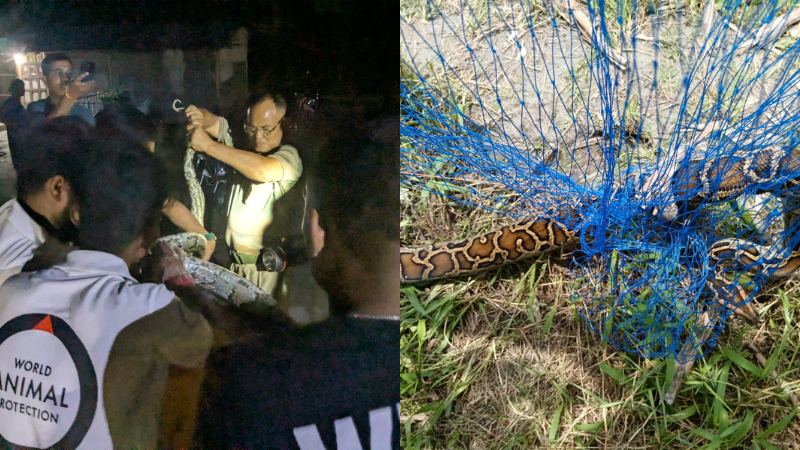
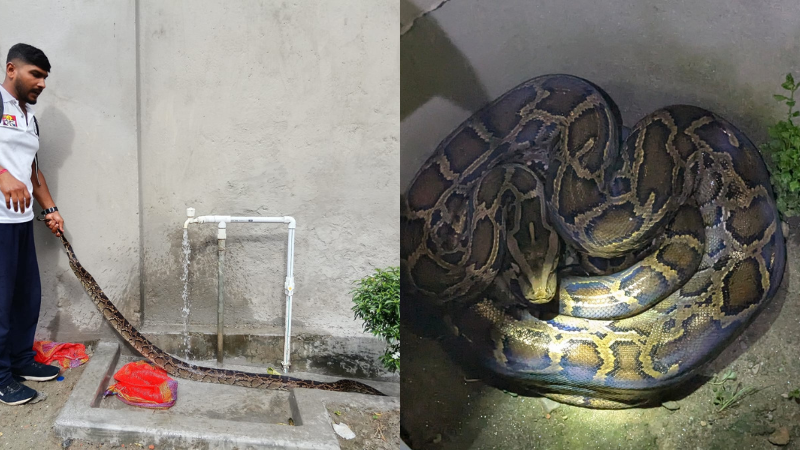
Giving Four Fledgling Mynas a Second Chance
On July 3, 2025, four tiny Common Mynas were found after falling from a tree in Bongaon, North 24 Parganas. The fledglings were weak and slightly malnourished, having been separated from their parents for more than a day. Thankfully, local residents acted quickly, alerting our team and the Forest Department, ensuring the young birds received immediate care.
Our team took them into short-term custody, providing warmth, nutrition, and a safe environment. Initially hand-fed with specialized formula, the chicks soon gained strength and were gradually introduced to fruits and natural foraging habits. With each passing day, they learned to perch, flutter, and even practice short flights inside their enclosure.
Today, these fledglings are steadily growing stronger and more independent. Soon, once they are fully capable of surviving on their own, they will be released back into their natural habitat.
This rescue reminds us how small acts of kindness—like alerting authorities instead of ignoring fallen chicks—can give fragile lives a real chance at freedom in the wild.
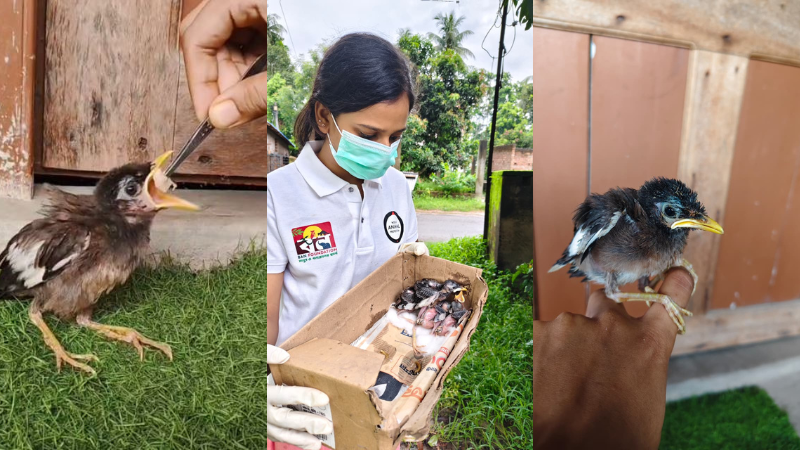
A Hawk-Cuckoo’s Flight Back to Freedom
On July 10, 2025, a distressed Common Hawk-Cuckoo was discovered in Gaighata, North 24 Parganas, lying weak and dehydrated on the ground. Unable to fly or even perch, the bird’s condition was critical. Thankfully, local residents reached out immediately, and our team stepped in.
The bird was gently rehydrated and placed under quiet, stress-free care. Over the next 17 days, it received a protein-rich diet of mealworms, chicken, and fruits, while regaining its natural strength in an enclosure designed with perches and branches. Slowly, it began to perch again, respond to its surroundings, and display healthy wild behaviors.
On July 27, 2025, the Common Hawk-Cuckoo was released back into its natural habitat—strong, alert, and ready to thrive once more.
This rescue is a reminder that even the smallest act of compassion can restore life and freedom to our wild neighbors.

What Makes This Possible?
Your support made this rescue possible. From transport and nutrition to weeks of patient rehabilitation, every contribution ensures vulnerable animals get a second chance at life in the wild.
Thank You for Believing That Every Life Matters
As we prepare for more rescues in the coming months, your contributions and encouragement power our mission. Stay connected with us, spread awareness, and be part of a kinder, safer world for all animals.
Want to help?
Join us, support our work, or just share our stories. Because when animals are protected, we all thrive.
Read More Animal Rescue Updates
-
September 2025 - Our Wildlife Rescue Stories
Blog
Our Animal Protector team rescued and rehabilitated 53 wild animals through 52 timely interventions across the region.
-
August 2025 Wildlife Rescue Stories
Blog
In August 2025, our Animal Protector Program rescued and rehabilitated 55 wild animals across West Bengal, turning fear...
-
July 2025 Wildlife Rescue Stories
Blog
This July, discover how Civets, Spotted Doves, Burmese Pythons, Common Mynas, and a common Hawk-Cuckoo were rescued and...


